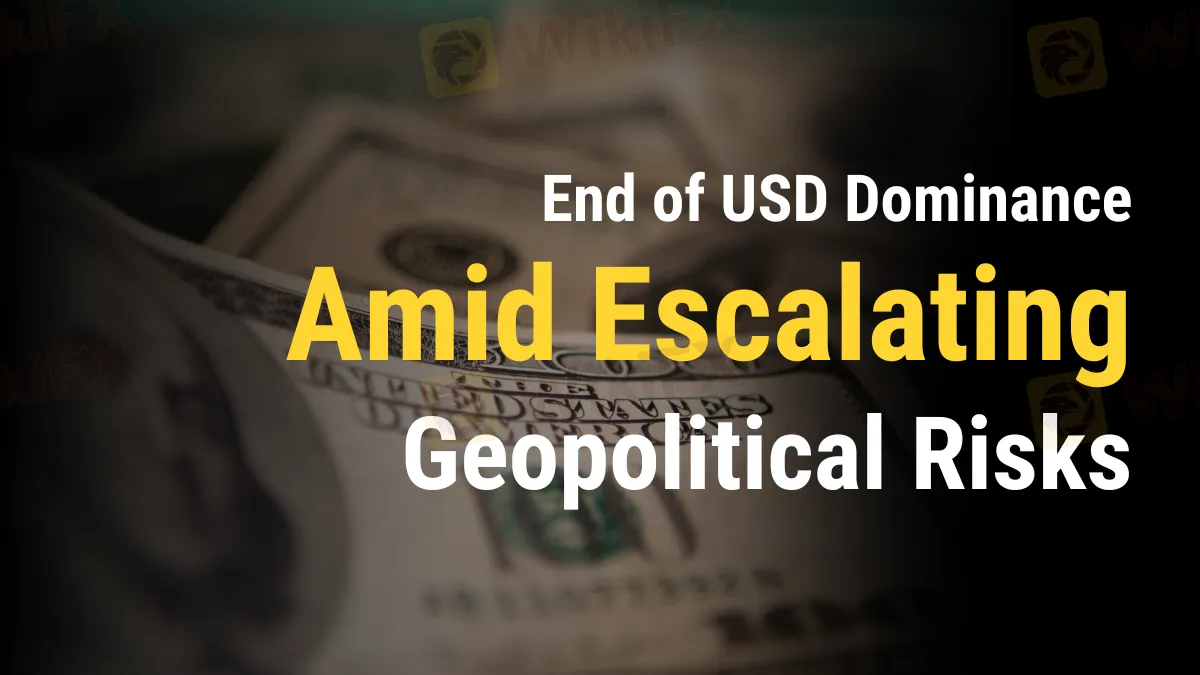简体中文
繁體中文
English
Pусский
日本語
ภาษาไทย
Tiếng Việt
Bahasa Indonesia
Español
हिन्दी
Filippiiniläinen
Français
Deutsch
Português
Türkçe
한국어
العربية
End of USD Dominance Amid Escalating Geopolitical Risks
Abstract:After Israel's retaliation, currency markets face volatility, reflecting geopolitical tensions and influencing global currency forecasts.

After Israel's retaliatory assaults on Iran, currency markets have seen heightened volatility, suggesting a potential shift in the dominant role of the US dollar.
According to recent data from the Philly Fed manufacturing survey, there was an early increase in confidence in the US currency. This aligns with the Federal Reserve's prudent monetary policy approach.
However, concerns arise over the long-term sustainability of this advancement, considering the escalating global conflicts. The 2% increase in crude oil prices highlights the market's susceptibility to geopolitical events, adding complexity to currency forecasts.
Positive and negative economic outcomes were observed in the United States before the geopolitical escalation, with concerns regarding the repercussions of a strong dollar contributing to this balance. The IMF's cautions over divergence, namely regarding significant fiscal deficits in the US relative to other advanced countries, have intensified market examination. Although the dollar demonstrates resilience against specific currencies, market sentiment suggests that this discrepancy may be subject to limitations.

Due to the disparity in interest rates between the European Union and the United States, in addition to cautious statements by ECB officials, currency forecasts have become more complicated. Subsequently, the Japanese yen initially appreciated following the reaction from Israel, indicating a more widespread avoidance of risk. However, upon closer inspection of the data from Japan, a more nuanced picture emerges due to the unexpectedly low Consumer Price Index (CPI) readings, which raise concerns about the potential presence of inflationary behaviors.
The complicated balance in global foreign exchange discussions is evident since Washington expresses no significant worry over the declining value of the yen. The correlation between geopolitical events and currency markets underscores the need for flexible policies and approaches. While an initial aversion to risk may exist, policy measures and broader economic fundamentals will ultimately determine the course of currency fluctuations.
In the current period of instability, investors must possess an all-encompassing understanding of global dynamics to identify potential opportunities amidst uncertainty.

Disclaimer:
The views in this article only represent the author's personal views, and do not constitute investment advice on this platform. This platform does not guarantee the accuracy, completeness and timeliness of the information in the article, and will not be liable for any loss caused by the use of or reliance on the information in the article.
Read more

CySEC Warns Against Unauthorized Investment Firms in Cyprus
CySEC warns investors about unregulated investment firms in Cyprus. Verify broker reliability through the WikiFX app to stay protected from scams.

STARTRADER Issues Alerts on Fake Sites and Unauthorized Apps
STARTRADER warns against counterfeit sites and apps using its brand name. Protect yourself by recognizing official channels to avoid fraudulent schemes.

Dukascopy Bank Expands Trading Account Base Currencies
Dukascopy Bank now offers AED and SAR as base currencies for trading, expanding options for clients to fund accounts in Dirham and Riyal.

PayPal Expands PYUSD Transfers to Ethereum and Solana
PayPal's PYUSD stablecoin can now transfer across Ethereum and Solana, enhancing flexibility for users through a LayerZero cross-chain integration.
WikiFX Broker
Latest News
JUST Finance and UBX Launch Multi-Currency Stablecoin Exchange
XM Revamps Website with Sleek Design and App Focus
Global Shift in Cryptocurrency Taxation: Italy and Denmark Chart New Paths
Webull Introduces 24/5 Overnight Trading to Extend U.S. Market Access
TradingView & Mexico’s Uni. Partnership, to Enhance Financial Education
Something You Need to Know About SogoTrade
eToro Launches Global-Edge Smart Portfolio: A Balanced Approach to Growth and Stability
Darwinex advises traders to update MT4 & 5
Revolut X Expands Crypto Exchange Across Europe, Targeting Pro Traders
Broker Review: Is Exnova Legit?
Currency Calculator


